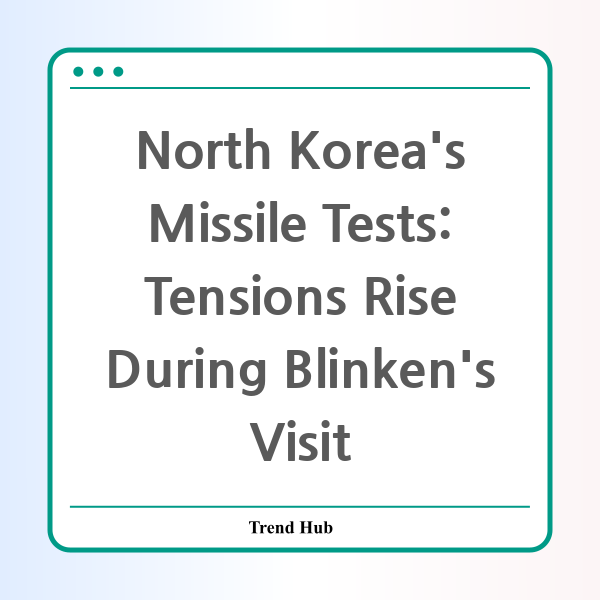* This website participates in the Amazon Affiliate Program and earns from qualifying purchases.

North Korea's recent testing of ballistic missiles has created ripples of concern across the globe, particularly observed during a sensitive diplomatic visit by U.S. Secretary of State Antony Blinken to South Korea. Such provocative actions by North Korea not only challenge international peace but also underscore the essential need for unity among allies in the face of escalating threats.
The missile launch, which South Korean military officials identified as a medium-range ballistic missile, was carried out on January 6, 2025, at around noon local time, just as Blinken was in the country to discuss collaboration on security issues. This test, noted for its timing, comes shortly after North Korea's last missile launch on November 5, indicating a continued pattern of aggression.
According to the South Korean Joint Chiefs of Staff, the missile was launched from the Pyongyang area and flew approximately 684 miles before falling into the East Sea. This trajectory highlights the potential range that North Korea's missile capabilities can threaten, raising alarms not just for South Korea, but also for Japan and the United States.
During a press conference in Seoul, Blinken condemned this missile test as "yet another violation of multiple Security Council resolutions," emphasizing the serious nature of North Korean provocations. He reiterated that despite the United States' attempts to engage North Korea in diplomatic discussions without preconditions, the response had been provocative actions like missile launches. This backdrop of tension illustrates the fragility of peace in the region and the challenges faced by diplomatic engagements.
In response to the missile test, South Korea has increased its military readiness and surveillance for additional provocations. This includes a commitment to enhance information-sharing capabilities with the United States and Japan, which is crucial in maintaining a deterrent against North Korea's aggressive posturing. The trilateral cooperation is a significant element in confronting the evolving threat posed by North Korea.
Japan, too, voiced strong condemnation following the missile test, with Defense Minister Gen Nakatani calling North Korea's actions a "grave threat" to regional security. The Japanese government has reaffirmed its commitment to enhance alliances with the U.S. and South Korea, emphasizing the importance of a unified front against North Korean hostility.
As tensions escalate, there are broader implications regarding North Korea's ties with Russia. Blinken warned that North Korea's deepening relations with Moscow might lead to the exchange of military technologies, which could embolden Pyongyang further. Such developments necessitate greater awareness and responsiveness from the international community regarding North Korea's missile advancements and strategic partnerships.
In light of these events, the necessity for a robust response from the U.S. and its allies cannot be overstated. Enhanced military drills, improved missile detection systems, and consistent diplomatic outreach are vital components in developing a comprehensive strategy against North Korea's missile threats.
The current geopolitical landscape serves as a reminder of the complexities involved in international relations, especially concerning North Korea. Ongoing missile tests, amidst efforts at diplomatic engagement, highlight the delicate balance that must be maintained to ensure stability in the region.
As we watch the developments unfold, it is clear that cooperation among the U.S., South Korea, and Japan will remain critical in countering the threats posed by North Korea's military ambitions. The international community must therefore remain vigilant and prepared to respond to any further provocations that may arise.
* This website participates in the Amazon Affiliate Program and earns from qualifying purchases.